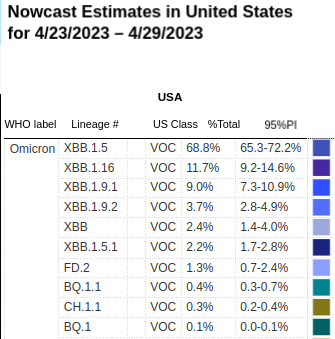#17,429
During the opening year of the COVID pandemic, recombination was rarely mentioned as driving the evolution of the virus. SARS-CoV-2 was considered relatively `stable', and genetic changes were chalked up to antigenic drift, caused by random replication errors.
Recombination is the sharing of genetic material between similar genomes that simultaneously infect a single host. The resultant hybrid is called a recombinant.

It wasn't until the summer of 2021 that we learned of a`documented' dual infection with two COVID variants (Alpha & Beta), which was presented initially at the 31st ECCMID Conference.
Around the same time, a study called SARS-CoV-2: Possible recombination and emergence of potentially more virulent strains, was published in PloS One. But actual evidence of recombination of the virus was scant.
The emergence of recombinant variants was still considered mostly a theoretical concern, but that summer the UK's SAGE publicly discussed the possible emergence of a more severe COVID variant via recombination (see UK SAGE: Can We Predict the Limits of SARS-CoV-2 Variants and their Phenotypic Consequences?).
By early 2022, we were beginning to see scattered reports of `likely' recombinant variants, although none had managed make much of an impact. In February 2022 the UKHSA made headlines when they announced that they were monitoring a recombinant virus (see A COVID Recombination Review).
It wasn't until last fall, however, that we finally saw the rise and rapid spread of a recombinant virus (XBB), which the CDC began tracking in the United States in late November. A month later, the writing was on the wall (see CDC Nowcast: A New Dominant Variant (XBB.1.5) For A New Year).
Four months later, six XBB*.* variants make up roughly 98% of the COVID viruses in this week's CDC Nowcast, and about 75% of viruses globally according to the WHO.
While XBB.1.5 remains hugely dominant in the United States, it continues to lose ground to newcomers XBB.1.16, XBB.1.9.1, and XBB.1.9.2.
So far, we've not seen any evidence that these XBB recombinant variants pose any greater health risks than their Omicron ancestors, but they still appear to be gaining in transmissibility and immune evasion over time.
Whether this dramatic shift to recombination as the driving force behind COVID's evolution makes any tangible difference to how the pandemic plays out is unknown. We are literally less than six months into this new phase of COVID's evolution, and the virus continues to explore new trajectories.
But it is a reminder that COVID in particular - and viruses in general - can still find ways to surprise us, and that we shouldn't get too attached to our current expectations.

